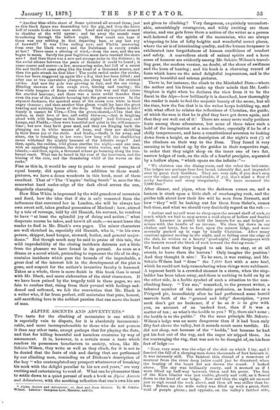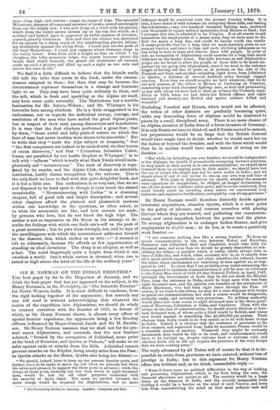ALPINE ASCENTS AND ADVENTURES.*
THE taste for the climbing of mountains is one which it is especially vain to dispute, for it is absolutely incommuni- cable, and more incomprehensible to those who do not possess it than any other taste, except perhaps that for playing the flute, and that for killing beautiful and harmless creatures by way of amusement. It is, however, in a certain sense a taste which renders its possessors benefactors to society, when, like Mr. Schutz-Wilson, they write as well as they climb, for it is not to be denied that the feats of risk and daring that are performed by our climbing men, reminding us of Dickens's description of the boy " who contemplated any prospect whatsoever of breaking his neck with the delight peculiar to his sex and years," are very exciting and entertaining to read of. What can be pleasanter than to settle down to a quiet perusal of such a book as Alpine Ascents and Adventures, with the soothing reflection that one's own kin are • Alpine Ascents and Adventures; or, Sock and Snow Sketches. By H. Schatz- Wilson. London : Sampson Low, Marston, and Co. not given to climbing? Very dangerous, exquisitely uncomfort- able, astonishingly courageous, and wildy exciting are these stories, and one gets from them a notion of the writer as a person
well-beloved of the spirits of the mountains, who are always whispering to him of lofty heights and wonderful secret places, where the air is of intoxicating quality, and the human trespasser is exhilarated into forgetfulness of human conditions of comfort and safety. A marvellous stock of animal spirits and a keen sense of humour are evidently among Mr. Schiitz-Wilson's travel- ling gear, the modern version, no doubt, of the shoes of swiftness and the horn of hearing ; and his book is a charming record of feats which leave on the mind delightful impressions, and in the memory beautiful and solemn pictures.
There is, for instance, the climb to the Mischabel Dom--where the author and his friend make up their minds that Mr. Leslie Stephen is right when he declares the view from it to be the finest in the Alps—how brilliantly it is described, how thoroughly the reader is made to feel the majestic beauty of the scene, but all the time, how the fun that is in the writer keeps bubbling up, and with what effect he relates the reflections of Christian, the guide, of which the sum is that he is glad they have got down again, and that they are well out of it ! There are many more really perilous feats among these adventures, but none of them takes such a hold of the imagination of a non-climber, especially if he be of ar chilly temperament, and have a constitutional aversion to looking down from a height, as the description of the night's rest (!) of the climbers on their way to the Dom. They found it very amusing to be tucked up by the guides in their respective rugs, in order that they might sleep on the inner one of two fiat, narrow ledges of rock, on the side of a fearful precipice, separated by a hollow abyss, "which opens on the infinite :"—
" We christen one the dining-room, and the other the bed-room. The ledges are perhaps four feet broad, tolerably flat, and impended over by great rock boulders. They are very safe, if you don't step over the edge, and pretty comfortable, if you don't mind a floor of rocky hardness and stony irregularity. We have mounted the
7,000 feet."
After dinner, and pipes, when the darkness comes on, and a lantern is stuck upon a little cleft of overhanging rock, and the guides talk about how their fire will be seen from Zermatt, and how " they " will be looking out for them from Sieler's, comes bed-time, and what we should very decidedly regard as the rub :- "Arthur and myself were to sleep upon the second shelf of rock, to reach which we had to step across a void abyss of hollow and fearful depth. Lauener (a guide) held the lantern for us, and helped us across with the handle of an ice-axe. We then lay down in our clothes and boots, feet to feet, upon the narrow ledge, and were severally packed up in rugs by kindly Christian. After many cautions against moving in the night, and so falling over the edge of the slab, he wishes us a hearty good-night,' and disappears with the lantern round the block of rock toward the dini ng-room."
We feel sure that they longed to ask him to stay, or at all events, to leave them the lantern ! Only imagine the position ! And they thought it nice ! To be sure, it was resting, and Mr. Schiitz-Wilson had " done " the 7,000 feet with a sore heel, which he could not help remembering when things were sublimest.
A topmost berth in a crowded steamer in a storm, when the step- ladder has been taken away, and there is nothing to hold on by at the other side, is a feeble symbol of such a situation to the non- climbing fancy. " You see," remarked, to the present writer, a talented member of the acrobatic profession, as boneless as a.
Perigord pie, immediately after he had performed some horrid marvels both of the " ground and lofty" description, " your
neck don't get no brokener, if s' be as it is to give with you, on account of an 'undred foot, than if it was a matter of ten ; so what's the hodds to you ? Wy, there ain't none ;. the hodds is to the public." On the same principle Mr. Schiitz-
Wilson's ledge was no more dangerous than if it had been only fifty feet above the valley, but it sounds much more terrible. He did not sleep, not because of the " hodds," but because he had got his feet out of the rug, and the eager air nipped them. As for rearranging the rug, that was not to be thought of, on his four feet of ledge :-
'Near, very near, was the edge of the slab on which I lay, and I fancied the fall of a sleeping man down thousands of feet beneath it. It was intensely still. The faintest thin thread of a monotone of murmur from the liver deep below could just be discerned, when the beating of the heart did not drown the sound. I looked above. The sky was brilliantly starry, and it seemed as if I were lifted up half-way between Orion and his peers. The foot of the Bien Glacier was just visible, ghostly and cold, as it flowed down to the level of our ledge. Now and then the night air seemed jest to sigh round the rock above, and then all was stiller than be- fore. Before me the wide valley was filled up with a great, dusk void of purple gloom ; and opposite, on the valley's farther side, rose—long, high, and sombre—range on range of Alps. The splendid Weisshorn, sharpest of cones and snowiest of peaks, soared sovereignly from out the kingly row. I was now lying on a level with his glacier, which from the valley seems shrunk up to his top, but which, as 1 reclined and looked upon it, appeared an awful expanse of crevasse- seamed, ghastly whiteness. Now and then the silence was shattered for an instant by a sharp crack of the neighbouring glacier, labour- ing stubbornly against the riving frost. I could just see the peak of the fatal Matterhorn ; I could just suppose where Zermatt slept in the valley below. Seen from such a height as that on which I lay sleepless, the lofty mountain ledge, the starry heavens above, the broad, dark depth beneath, the grand old mountains all around, made up such a picture and filled up such a night as one sees and knows but once in life."
We find it a little difficult to believe that the friends really did talk the talks that occur in the book, under the circum- stances assigned to them ; but then that may be because the circumstances represent themselves in a strange and fearsome light to us. They may have been quite ordinary to them, and the talk, which is fresh and sparkling as the Alpine air itself, may have come quite naturally. The Matterhorn has a terrible fascination for Mr. Schiitz-Wilson ; and Mr. Whymper is his favourite hero among climbers. He is a little exaggerated in his enthusiasm, not as regards the individual energy, courage, and resolution of the men who have scaled the great Alpine peaks, but in respect of their rank among discoverers and benefactors. It is true that the first climbers performed a great feat; that by them, "those awful and lofty parts of nature on which the foot of man had never trodden were shown to be accessible." But to write that they " made the Alps subject to humanity," that " the first conquerors are indeed to be ranked with the first heroes of ocean discovery," and that " Columbus, Sebastian Cabot, Gama, are paralleled by our Leslie Stephen or Whymper," is to talk with " tallness " which is really what Mark Twain would meta- phorically call "mountainous." The rank of discovery is regu- lated by its results, and the Alpine Club, though an admirable institution, hardly claims recognition by the universe. This is the only fault we have to find with this quite delightful book, and it is but a little one. Rea enthusiasm is so very rare, that we are not disposed to be hard upon it, though it even touch the absurd occasionally. " Mountaineering with Ladies " is a charming chapter, full of good talk and bright description ; and several other chapters afford the plainest and pleasantest answers within our knowledge to the questions, so often asked, as to what the mountains are like, and how ascents are made, by persons who love, but do not know the high Alps. The author is not so impressive as Mr. Bryce in his attempt to de- scribe the feelings with which one finds one's-self on the peak of a great mountain ; but he puts them strongly, too, and he says of the unwillingness with which the mountaineer addresses himself to the descent, this, which strikes us as true :—" A summit is left so reluctantly, because life affords so few opportunities of standing on ideal elevations. The thing is an allegory, as well as a fact. The mind lingeringly quits a height from which it can overlook a world. One's whole nature is elevated, when one is raised so high above the level of the life of the ordinary years."







































 Previous page
Previous page